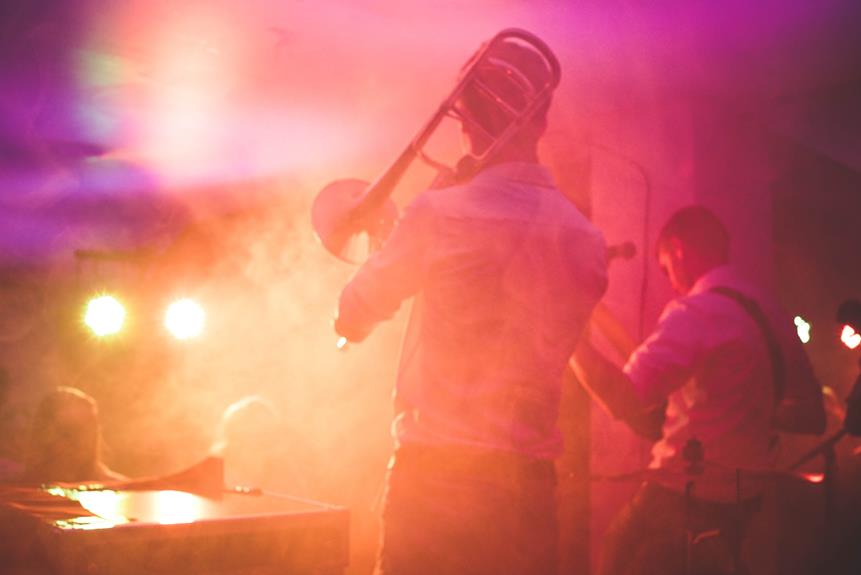
So, you might be wondering why on earth the New Orleans Jazz Festival is scheduled now, right in the midst of your busy schedule.
Well, there's actually a lot more to this timing than meets the eye. The decision to hold the festival at this specific time of year involves a complex interplay of cultural, economic, and logistical factors that all contribute to making this event the iconic and vibrant celebration it is.
You'll be surprised at the layers behind this seemingly straightforward scheduling choice, and the impact it has on the festival as a whole.
Key Takeaways
- The New Orleans Jazz Festival is scheduled in late April and early May to align with favorable weather conditions and ensure the availability of a wide range of artists.
- The festival's timing creates two equal four-day weekends, allowing for more immersion in music and culture.
- The festival coincides with a culturally vibrant time in the city and draws in music lovers and enthusiasts from around the world.
- The festival's timing boosts tourism, benefits local businesses, and supports the cultural heritage of New Orleans through economic development and year-round activities.
History of New Orleans Jazz Fest Schedule
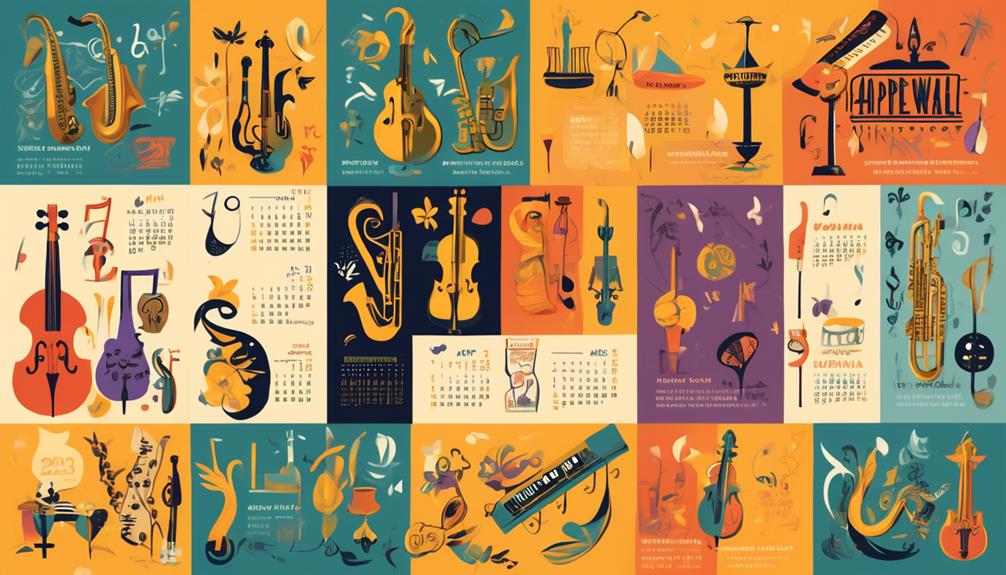
Explore the evolution of the New Orleans Jazz & Heritage Festival schedule over the years, tracing its significant changes and enduring traditions.
The history of the New Orleans Jazz Fest schedule is rich and dynamic. Initially taking place over just a few days, the festival has expanded to eight days, allowing for a more extensive and diverse lineup. The Heritage Foundation, the organization behind the festival, has been instrumental in shaping the schedule to accommodate the growing popularity and demand for a broader range of musical performances.
The festival's history is deeply intertwined with the Fair Grounds Race Course, where it first began, and Congo Square Stage, a significant venue for showcasing local talent. In the past, the Jazz Fest took place over fewer days, but thanks to the efforts of key figures like George Wein, the festival's founder, the schedule has adapted to encompass a more comprehensive and inclusive program.
The introduction of a new opening day has added to the anticipation and excitement surrounding the festival, making it a much-anticipated event for music enthusiasts and fans of New Orleans Jazz and Heritage Festival.
Impact of the Festival's Timing
How does the timing of the New Orleans Jazz Festival impact the overall experience for attendees and the city's cultural vibrancy?
The timing of the New Orleans Jazz and Heritage Festival has a significant impact on the overall experience for attendees and the cultural vibrancy of the city.
The festival's expanded timing creates two equal four-day weekends, providing more opportunities for attendees to immerse themselves in the music and culture.
The festival coincides with a culturally vibrant time in the city, allowing visitors to experience the unique heritage of New Orleans and Louisiana.
Moreover, the extended period of celebration draws in music lovers and enthusiasts from around the world, contributing to the economic development and cultural heritage of New Orleans.
Additionally, the carefully curated lineup featuring a diverse range of artists and genres ensures that there's something for everyone, further enhancing the impact of the festival's timing.
Seasonal Considerations for Jazz Fest
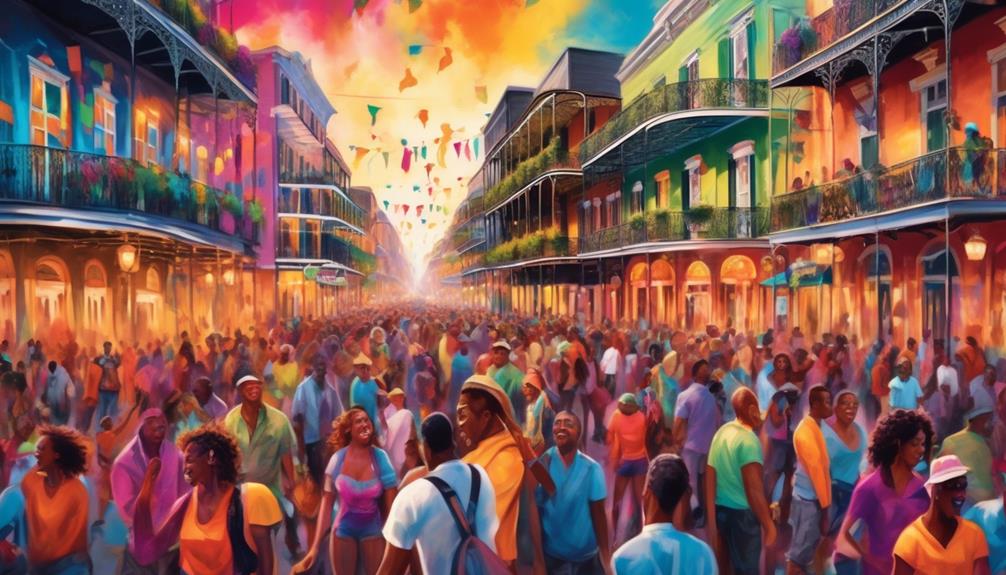
Considering the seasonal factors that influence Jazz Fest, you'll find that the festival's timing plays a crucial role in shaping the overall experience for both attendees and the city of New Orleans.
The New Orleans Jazz & Heritage Festival, scheduled to kick off on a Thursday, has strategically chosen its timing to align with the city's vibrant spring season. This timing allows attendees to revel in the pleasant weather and the city's blooming scenery while immersing themselves in the rich cultural heritage and music that the festival offers.
By hosting the festival during this time, organizers take advantage of the favorable climate, making it an ideal setting for outdoor musical performances and cultural enrichment activities. Additionally, the festival's scheduling during the spring season helps to boost tourism, benefiting local businesses and the city's economy.
Moreover, the choice of a Thursday as the New Opening Day provides attendees with an extended weekend to enjoy the music, food, and festivities, maximizing their experience at the annual event.
Cultural Significance of the Festival Dates
The festival dates hold cultural significance due to their alignment with the vibrant heritage and music of New Orleans and Louisiana, drawing nearly 500,000 people annually. This cultural significance is multi-faceted:
- Celebration of Cultural Heritage: The festival serves as a celebration of the rich cultural heritage of New Orleans and Louisiana, showcasing the diverse and influential music scenes that have shaped the region.
- Economic Development: The festival dates are strategically chosen to promote economic development. By creating two equal four-day weekends, it encourages longer stays and earlier bookings, benefiting local businesses and the tourism industry.
- Culinary Delights: The festival's timing also allows attendees to indulge in the world-renowned Louisiana cuisine. Visitors can explore the local culinary scene, adding an extra dimension to their cultural experience.
The festival's dates coincide with the Fair Grounds Race, offering an extended cultural experience that captures the essence of New Orleans and Louisiana. This strategic alignment ensures that attendees can immerse themselves not only in the music but also in the broader cultural tapestry of the region.
Economic and Tourist Implications
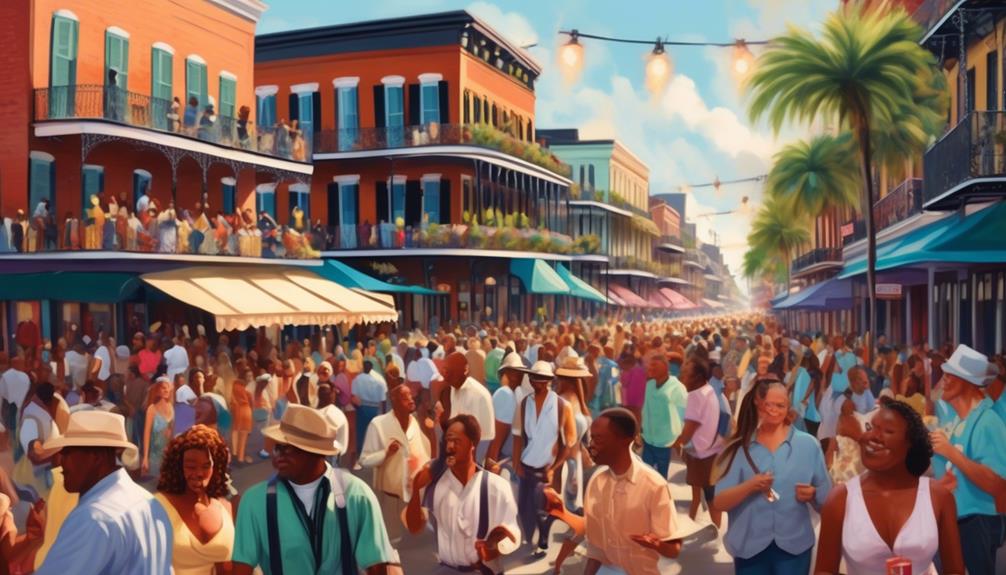
The New Orleans Jazz Festival's economic and tourist implications have a significant impact on the local economy and attract visitors from around the world. The annual New Orleans Jazz & Heritage Festival presented by Shell is a vital contributor to the economic development and cultural heritage of New Orleans.
With nearly 500,000 attendees each year, the festival creates economic opportunities for local businesses, hotels, and restaurants. The festival's expansion to an eight-day event further bolsters these economic benefits.
As tourists flock to the Fair Grounds to enjoy the diverse lineup of artists and genres across multiple stages, they not only contribute to the local economy but also support the rich culture and heritage of New Orleans. Purchases of official merchandise, such as posters and Bayouwear, also generate revenue and contribute to economic activities during the event.
Moreover, the proceeds from the festival are utilized by the nonprofit organization, the New Orleans Jazz & Heritage Festival and Foundation, Inc., for year-round activities in education, economic development, and cultural enrichment. The Jazz Fest Ticket sales and the influx of visitors greatly bolster economic and cultural vibrancy in the region, making it an event of immense significance.
Festival Timing and Artist Availability
To ensure a diverse and appealing lineup for attendees, the New Orleans Jazz Festival is strategically scheduled during late April and early May, taking advantage of favorable weather conditions and aligning with the availability of a wide range of artists, both local and international.
This timing allows for the creation of two equal four-day weekends, extending the festival's duration and providing more opportunities for attendees to experience the diverse musical performances.
Additionally, the festival's schedule coincides with the availability of notable performers, such as the highly anticipated performance by the Rolling Stones at Jazz Fest 2024.
Furthermore, hosting the festival during this time also benefits attendees by providing better fares for mid-week flights and availability of downtown hotel shuttles, making it easier for them to plan their travel arrangements.
Community Engagement and Local Participation
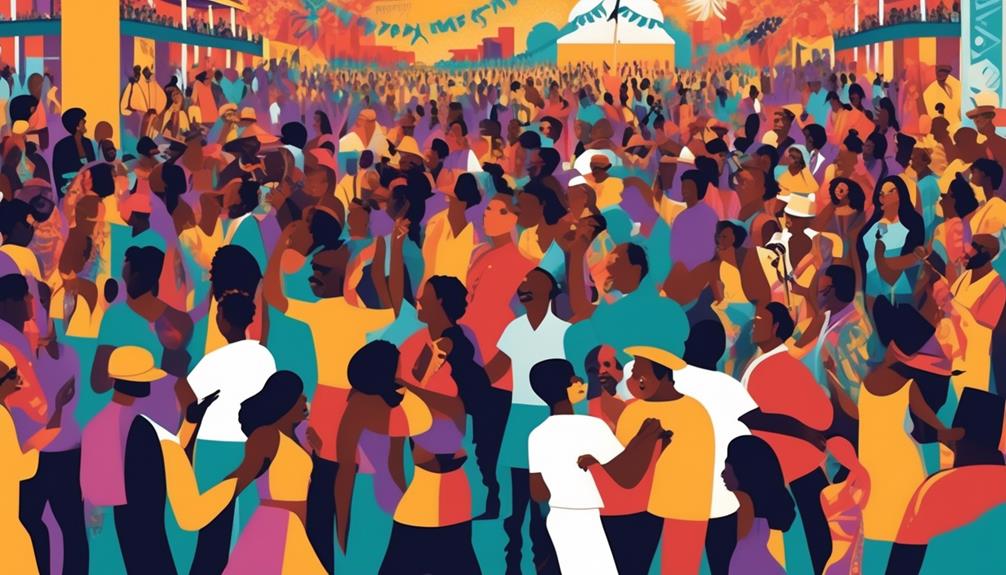
Engaging with local communities and showcasing diverse musical talents is a fundamental aspect of the New Orleans Jazz Festival. The annual New Orleans Fest celebrates the vibrant culture and rich musical heritage of the city.
Through community engagement and local participation, the festival serves as a platform for both local and international artists to converge and share their music styles. It provides a stage for the Mardi Gras Indians and other local musicians to display their talent, contributing to the festival's dynamic and diverse lineup.
In doing so, the Jazz Fest actively supports the local community, promoting social aid and cultural enrichment. By representing various music genres, the festival caters to the eclectic tastes of the residents and visitors, fostering a sense of inclusivity and representation.
The New Orleans Jazz & Heritage Festival and Foundation, Inc. extends its commitment beyond the festival, engaging in year-round activities that focus on education, economic development, and cultural enrichment, further solidifying its dedication to the local community.
Frequently Asked Questions
Is the New Orleans Jazz Festival Still On?
Yes, the New Orleans Jazz Festival is still on! Event status remains confirmed. COVID precautions and safety measures will be in place. Check for ticket refunds and updates on the artist lineup. The festival will have a local impact, and virtual options may be available. Stay informed about attendance restrictions and public health concerns.
What Is the Jazz Fest Schedule?
You're in for a treat at Jazz Fest 2023! The performance lineup is stacked with diverse artists. Ticket prices vary, but there's something for everyone. Food vendors, workshops, and the art market offer a full experience.
How Many People at Jazz Fest 2023?
Over 500,000 people attended the Jazz Fest in 2023, enjoying the vibrant festival atmosphere, diverse musical performances, delicious food vendors, captivating art exhibits, and the cultural significance of New Orleans. The festival offers various ticket prices, transportation options, local accommodations, and favorable weather conditions.
Why Is Jazz Fest Celebrated?
You celebrate Jazz Fest for its cultural significance, community gathering, and diverse showcase of musical heritage. It's a vibrant expression of New Orleans' historical roots and generational influence, boosting the local economy and tourism impact.
Conclusion
So, now you know why the New Orleans Jazz Festival is scheduled when it is.
Fun fact: Did you know that the festival brings in over 400,000 visitors each year, generating millions of dollars in economic impact for the city of New Orleans?
With its rich history, diverse lineup, and cultural significance, the festival's timing is crucial in attracting tourists and supporting the local community.
Don't miss out on this incredible musical experience!
